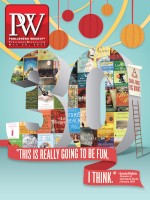Human-rights lawyer, activist, and U.C. Davis professor Karima Bennoune channels the diverse artists and human-rights workers resisting extremism in Muslim-majority countries in Your Fatwa Does Not Apply Here: Untold Stories from the Fight Against Muslim Fundamentalism.
What made you want to write this book?
It really sprang from watching my father live through the struggle against fundamentalism in Algeria, his home country, and take an outspoken position that was very critical of fundamentalism as an idea—of fundamentalist violence, but also of things that the state did. He risked his life, as did so many Algerian intellectuals. Yet it seemed that almost no one in the international community was paying attention to voices like theirs. The book is about finding the people out there today like my father who are taking independent, outspoken, principled positions—against extremism, against fundamentalism, against terrorism—and trying to bring their voices to a larger audience.
Art as a place for free expression and debate, as well as for education, looms large in your narrative.
I think about being in Pakistan in 2010. I spent time with Faizan Peerzada, who recently passed away. He was head of the Rafi Peer Theater Workshop. He and his family and their theater company ran cultural programming that he tried to make as accessible as possible to as many Pakistanis as possible, despite the fact that they were regularly threatened by jihadi groups. In fact, in 2008, the World Performing Arts Festival, which they organized, was blown up by a series of attacks. [The theater company] made the decision that same night to go on with the festival. As Faizan said, we can’t bow down to these people because if we do—as he told the BBC and as I quote in the book—we’ll just be sitting in a dark corner. These artists are so much about being the alternative to that dark corner.
Why are women’s rights central here?
The women’s-rights defenders are at the forefront of the struggle against fundamentalism. The championing of women’s human rights has to be a central tenant of any struggle against Muslim fundamentalism and extremism. I worry about this policy of making peace with the “moderate” Taliban, which is the biggest oxymoron in history.
What is the most important thing you want people to take away from the book?
There is incredible diversity among people of Muslim heritage. They have a wide range of relationships to Islam, just like people here have a wide range of relationships to Christianity or Judaism. Just beginning to think in a more complex way can bring a better perspective to questions about extremism and terrorism.



 Volume 260
Issue 20
05/20/2013
Volume 260
Issue 20
05/20/2013





